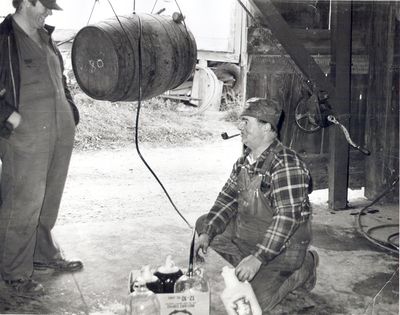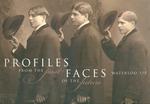Gordon Hergott
It was a cold February morning in 1922 and Gordon Hergott was
sitting with his sisters threshing beans. It was a tedious job the
children did every winter on the family farm.
Young Gordon was particularly quiet on this day and when a sister asked why, the 10-year-old said simply: “Next year we won’t be doing this by hand.”
True to his word, Hergott built a threshing machine that year to separate the dried beans from their pods. The small threshing machine would later inspire him to build a cider mill at the age of seventeen.
His childhood gift for design would help transform the homestead farm into a thriving business and education centre now known as Hergott Cider Mill and Products Ltd. on Erb Street West.
The red “rack and cloth” cider press that he built in 1929 became so popular among neighbouring farmers that people would be lined up down the lane every fall to get their apples pressed into cider.
During those early years, it took three hours to press one 45-gallon barrel of cider.
When demand for his mill increased such that it interfered with his farming, Gordon Hergott knew he had to build a larger mill. It took two years, but by 1934 he was open for business with a new mill that could press 100 gallons of cider in an hour.
This larger mill, which he designed by examining pictures, was made from parts gleaned from an old manure spreader, a threshing machine, a 1922 Overland engine and the transmission from a 1918 Dodge. During the busy fall season, Hergott ran the mill up to fourteen hours a day, six days a week.
It was an auspicious business for a man who had experienced a difficult childhood. Hergott’s father had died of typhoid and was buried on his son’s first birthday, and his mother passed away a month later. Hergott was raised by three aunts and the hired men on the farm.
Gordon Hergott never had a birthday celebration as a child because of the duty of mourning the loss of his parents, and any toy he ever had he made for himself. His son Joe recalls that his father told him of a toy car he made with spools and an empty box of matches.
The “1934” press ran for sixty-two years and then in 1997, Hergott’s son Joe purchased a new squeezebox press from a dairy and began putting cider into milk bags. Joe and his wife Gerrie, already well established in the business, carried on the milling tradition after Gordon Hergott died in 1993.
Today, about 30,000 bags are filled every year and more than 5,000 school children tour the “working museum.” Joe and Gerrie Hergott have expanded the educational component to include their award-winning honey-making operation. And, once a year during the Applefest celebrations, the “1934” mill is still run and demonstrations are given.
Although the Hergott homestead farm, originally over 200 acres, has been reduced to a much smaller 8 acres, Joe and Gerrie have enhanced Gordon Hergott’s legacy in Waterloo by making the farmstead an increasingly popular local destination.
As Gordon Hergott used to say “I knew where the last nail was going before I made the first cut”.
Photo courtesy of Joe Hergott
Gordon Hergott (Waterloo 150 Profile)
Description
- Creator
- Gallagher, Beth, Author
- Media Type
- Text
- Image
- Description
- To celebrate Waterloo's 150th anniversary, the Waterloo Public Library published a book called "Profiles from the Past, Faces of the Future." This book featured 150 profiles of people who helped make Waterloo what it is today. This is the digitized profile for Gordon Hergott.
- Notes
- Please visit the Waterloo Public Library to enquire about physical copies of "Profiles from the Past, Faces of the Future."
The Waterloo 150 project was funded by a grant from the Waterloo Regional Heritage Foundation. Beth Gallagher wrote the profiles with the assistance of many research volunteers. Information for the profiles was gathered from a variety of sources from the community and the Ellis Little Local History Room. Notable sources include the Ellis Little Papers, newspaper clippings, local magazines and books. - Place of Publication
- Waterloo, Ontario
- Date of Publication
- 2007
- Subject(s)
- Personal Name(s)
- Hergott, Gordon ; Hergott, Joe ; Hergott, Gerrie
- Corporate Name(s)
- Hergott Cider Mill and Products
- Language of Item
- English
- Geographic Coverage
-
-
Ontario, Canada
Latitude: 43.4668 Longitude: -80.51639
-
- Copyright Statement
- Uses other than research or private study require the permission of the rightsholder(s). Responsibility for obtaining permissions and for any use rests exclusively with the user.
- Contact
- Waterloo Public LibraryEmail:askus@wpl.ca
Website:
Agency street/mail address:35 Albert Street, Waterloo, Ontario, Canada, N2L 5E2
- Full Text




